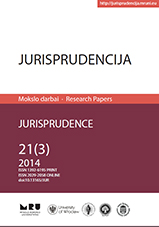BETWEEN CHOICE AND SECURITY: IRRETRIEVABLE BREAKDOWN OF MARRIAGE IN INDIA
BETWEEN CHOICE AND SECURITY: IRRETRIEVABLE BREAKDOWN OF MARRIAGE IN INDIA
Author(s): Radhika ChitkaraSubject(s): Law, Constitution, Jurisprudence
Published by: Mykolas Romeris University
Keywords: family law; marriage; India; no-fault divorce; economic interests of wife; jurisprudence; judicial discretion
Summary/Abstract: The Upper House of the Indian Parliament has recently approved irretrievable breakdown of marriage as a ground for divorce under the Hindu and secular marriage laws. While the liberalization of divorce upholds individual choice, it has adverse consequences upon women in a society where marriage is the primary source of their economic security. This paper argues that the Bill does not adequately protect the economic interests of women upon divorce. It fails to recognize marriage as an economic partnership, but characterizes the wife as a ‘dependant’ of the husband, worthy of only discretionary ‘compensation’. The paper consists of three parts. The first part relates the four decade long debate on no-fault divorce in India and compares it to the models in California and the UK. It is found out that the discourse underlying the debate is founded on two contradictory premises: first, that a marriage is a voluntary union of two equally autonomous individuals. This is opposed to social realities in India, where marriage is not a voluntary union, and the autonomy of wives is greatly curbed. Second, that the ‘autonomous’ wives are still punished for abdicating on ‘wifely’ duties within the home, and viewed as ‘unequal dependents’ whose independent economic contribution to the family is ignored. The debate also neglects the compelling empirical evidence from other jurisdictions, narrating the drastic fall in economic status of wives exacerbated by no-fault divorce. The second part narrates the gender-blind jurisprudence of the Supreme Court and High Courts which granted no-fault divorce without any legislative backing or any financial orders for the security of wives, thereby converting the debate on no-fault divorce to one solely on choice, and not on the security of wives. In the third part, the Marriage Laws (Amendment) Bill, 2013, which adopts the model of unrestrained judicial discretion to divide property between spouses, is specifically critiqued. It draws from the studies of Kirti Singh and Jaya Sagade to show that discretion in matrimonial litigation is normally exercised adverse to the interests of women. It concludes by stating that the interests of the Bill to uphold individual choice, and symbolically recognize marriage as a union of equals, would have been better served through a community of property regime, with equal division of marital property.
Journal: Jurisprudencija
- Issue Year: 21/2014
- Issue No: 3
- Page Range: 847-865
- Page Count: 19
- Language: English

